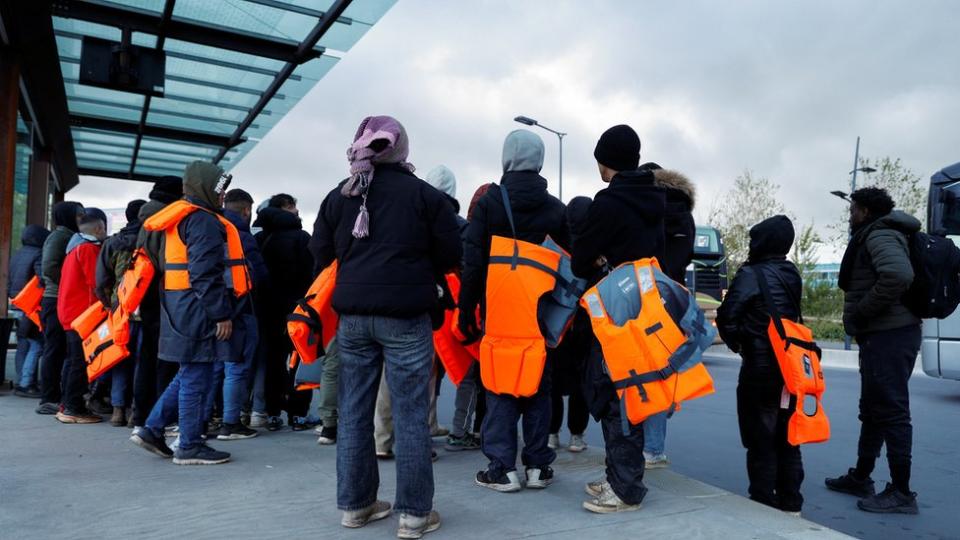The wind, which increased throughout the day on Tuesday and made it impossible for small boats to attempt further channel crossings, now appears to be easing. There are already signs around Calais that, despite yesterday’s deaths, smugglers are starting to push migrants towards the dunes along the coast in preparation for further launches.
We saw a group of Vietnamese who have recently arrived in northern France in large numbers and are making their way by bus. French police estimate that Vietnamese, many of whom appear to be escaping debts to gangsters back home, now make up 20% of all attempts to cross the Channel.
In the seaside resort of Wimereux, locals have digested the news that ten people have now died on their beaches this year, five of whom drowned on a slipway in January and five more now dying in the waters off a long beach near the golf course to the north the city.
The mayor of Wimereux, Jean-Luc Dubaele, told the BBC he had reached breaking point and was angry: “At some point we have to find lasting solutions and stop pretending that everyone is trying to fix things . Nobody.” when it comes to fixing things, things just keep getting worse.
Mr Dubaele has already argued that “the British are responsible”. He had previously suggested that the UK needed to tighten its employment rules because he said the prospect of finding work there was enticing so many people to attempt the crossing. Now he told French television: “The British are responsible for this.”
Three suspected smugglers who were on the overcrowded boat on Tuesday have now been arrested in Great Britain. They had continued their journey despite the deaths and reached British waters a few hours later.
However, there is no indication that the arrests or deaths will have a significant impact on the smugglers’ activities here in France. We spoke to a number of potential migrants and a UK-based leader of a smuggling network, all of whom said it was essentially business as usual.

“The boats are of good quality. When the sea is calm, it’s easy,” shrugged Noorislam, a 27-year-old from Afghanistan. He has been in Calais for a year and said he had made 10 attempts to cross the Channel, but were thwarted each time by French police.
The smuggling boss, who spoke on the phone to a BBC colleague, a Syrian, believing he was a migrant looking for a seat on one of his boats, insisted there was nothing to fear.
“Don’t worry, there’s no danger at all. Once you’re in the boat, call the Coast Guard. She will accompany you,” said the smuggler. He also rejected the threat of deportation from Great Britain to Rwanda.
“Don’t worry about this Rwanda issue. It’s broken,” he claimed.
French and British police are investigating what happened before dawn on Tuesday, but it is already clear that the main cause of the deaths was a dangerously overcrowded boat that two different groups of migrants tried to board.
We were on the beach when it happened and despite the chaos and darkness, it was clear that as a main group of migrants emerged from the dunes and rushed towards the sea in their dinghy, a second group suddenly joined them from further south. This second group did not have their own boat and seemed to act spontaneously on our behalf, probably hoping to catch a ride on the other group’s dinghy.
Were there fights within the boat between the different and presumably rival groups? In the dim light it was impossible to see what was happening just offshore. There were some screams and shouts and it was clear that the boat was dangerously overloaded.
Were there heated arguments between the smugglers over who was allowed on board? Or were the five deceased, including a seven-year-old Kurdish girl, simply victims of an already chaotic situation in which twice as many people as usual were fighting for a place on an overcrowded boat?
News of the deaths spread quickly among migrant communities waiting in their makeshift camps near Calais, Boulogne and Dunkirk. As we were talking to a group of Eritreans, someone – probably a smuggler – threw a stone at us to stop us from talking. It is clear that the smugglers are using violence, or at least threatening violence, to keep their paying customers in line.
“We’re not scared. If we die in the English Channel, God willed it. This is nothing compared to what we have already been through,” said one Eritrean.
French police continue to defend their handling of such incidents. They point to increasing signs of violence from smugglers, such as we saw on Tuesday, making it increasingly difficult to intervene without making the situation even more dangerous.
